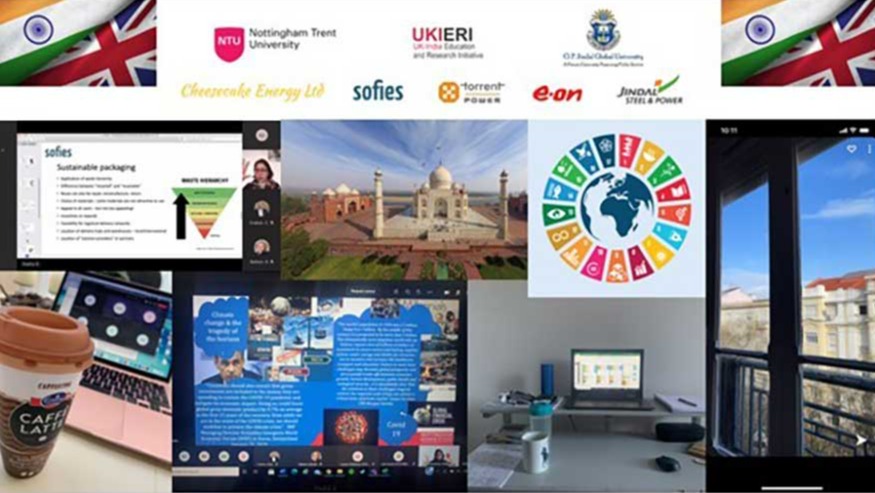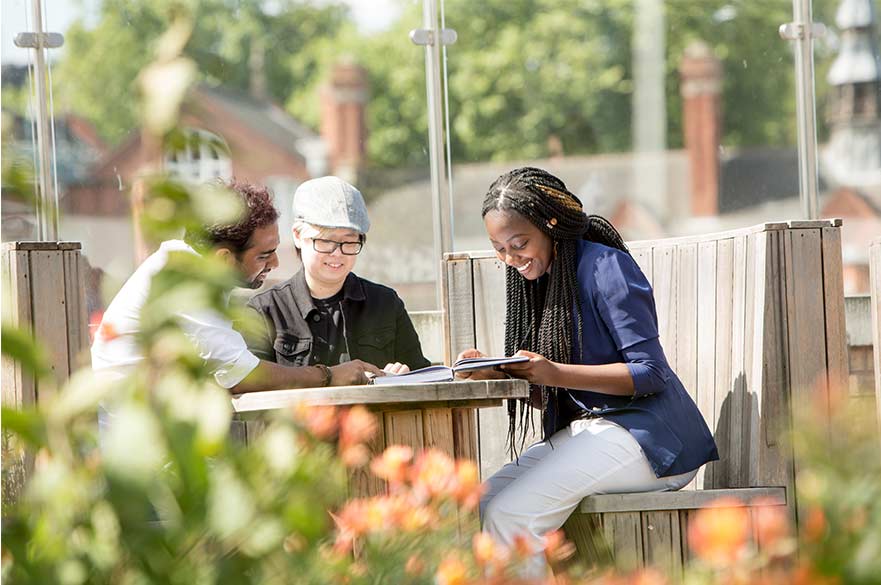O.P. Jindal Global University (JGU)
In January 2021, 50 students from Nottingham Business School (NBS) and O.P. Jindal Global University (JGU) took part in an innovative Collaborative Online Learning (COIL) project in business sustainability. You’ll find out more on this page.
Collaborating online

NTU and O.P. Jindal Global University (JGU) in India have a strong partnership in a broad range of areas including mobility, transnational education and research.
In January 2021, 50 students from Nottingham Business School (NBS), and JGU took part in a Collaboration Online International Learning (COIL) project within the field of business sustainability.
The 5-day virtual programme, funded by UKIERI (UK-India Education and Research Initiative), provided the participants with the opportunity to immerse themselves in the Indian and UK contexts. The mixed student groups, comprising 5 NTU and 5 JGU participants per group, gave them first-hand experience to collaborate across cultures in a virtual environment. Five distinguished business partners were enlisted to provide opportunities for the groups to develop innovative solutions to real business challenges.
The industry partners who took part in the programme were very diverse and ranged from multinational companies to start-ups and consulting firms. The current complexities of the climate crisis, business scandals and Covid-19 provided a powerful backdrop to the challenges. Despite their apparent differences, all had sustainability at the core of their challenges for the future and they need to be conversant with these issues as potential future business leaders.
Alongside the business challenges, the week was punctuated by a series of academic lectures delivered by global experts in sustainability and senior business figures. Mr Bimlendra Jha, former CEO of Tata Steel UK, shared his invaluable insights in the complex problems around sustainability and he inspired the students’ thinking, and challenged them on their conception of sustainability.
The week culminated in a series of group presentations in front of the industry partners where students were able to offer their recommendations on the challenges that had been posed to them. The feedback from the companies was excellent, for example one of the start-up companies said, “The students were very switched on and asked great questions, and some of the insights they presented back were genuinely informative and helpful".
Last year, students and institutions of higher education were not ready for prolonged campus closures. But, we were prepared to begin 2021 on a positive note with an intellectually stimulating virtual study tour with the Nottingham Business School. We are delighted to have partnered with NBS, and we look forward to co-hosting many such events, next time hopefully on the beautiful campuses of NTU and JGU.
Prof Ashish Bharadwaj, Dean Jindal School of Banking and Finance.
Social schedule and student feedback

There was a social schedule too and students were given the chance to interact informally through a range of informal activities organised by the NTU Virtual Global Lounge such as games, quizzes and even culinary challenges. Students could also explore famous landmarks in India, such as the Taj Mahal and the Natural History Museum in the UK through virtual tours.
The feedback received from the students was extremely positive and focused on the professional skills that they developed through the activities especially around working effectively across cultures in a virtual environment. They also considered that their international networks had been expanded which they considered would support their transition into their future professional careers.
One of the UK student participants said: “[the week] was good, allowed me to work virtually on a group project for the first time which will be vital experience for my final year of study and professional work”.
“The design of the project builds upon the experiential learning approach adopted at NBS and we intend to collaborate with Jindal School of Banking & Finance in future projects. The students were exposed to prestigious business leaders that enabled them to learn from international practitioners honing their knowledge and skills as part of a global community.”
There have been challenges along the way, but from these new learnings this potentially creates a platform to embed meaningful international experiences into the curriculum. Going virtual not only overcomes many of the issues of equity of access to international opportunities, but also reduces the carbon footprint of our international activities.